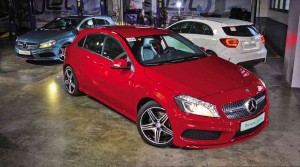Sneak peek: Mercedes-Benz A-Class hatchback
Mercedes-Benz wanted to extend its reach beyond the brand’s traditional market of medium to large sedan buyers. Thus they came up with the appropriately named A-Class, a hatchback that had the footprint of an A-segment car: truly, the baby Benz. Thanks to an innovative layout and design, within was the space of a much bigger car.
What it is: The third generation of Mercedes’ premium A-segment hatchback. The new car is a departure from the decisively practical roots of the earlier versions, on to a sportier direction.
Design: The new A-Class diverts from the baby-minivan looks of its predecessors, especially the original car, and exudes a sportier design. This is ostensibly to expand the appeal of the car to younger buyers and also to combat head-on the Audi A1 and BMW 1 Series. The new car has been made lower by up to 18 centimeters, with aerodynamic styling contributing to a low coefficient of drag of 0.26. Upwardly sweeping character lines on the doors, LED strips on the front and rear lights, and impressively large nostrils upfront accentuate the car’s sportier intentions. The front includes a punched metal grille that looks like you can grate your Butterkäse (German butter cheese) with it. The AMG body kit adds a front and rear apron, 18-inch multispoke light-alloy wheels and twin-pipe exhaust system.
The interior is also a strong invitation to drive, with form-fitting seats with red accents and a cockpit feel. Leather and carbon-fiber trim are the materials of choice.
Engine and transmission: A-Class will debut in the Philippines with the meatiest non-AMG engine available, a 2-liter inline-four. Thanks to turbocharging, the engine produces 211 horsepower and 350 Newton-meters from as low as 1200 revolutions per minute. The engine mates to a 7-speed dual-clutch transmission that provides nearly seamless delivery of torque with negligible shift shock.
Article continues after this advertisementSuspension: To help ensure that A-Class delivers on its promise of sporty driving, the new car has a multilink rear axle and electric power steering. The four-link axle works by having external forces absorbed by three control arms and one trailing arm per wheel. By having longitudinal and lateral dynamics act independently, the car offers better ride and handling characteristics. Wheel carriers and spring links are made of aluminum to reduce weight. The center of gravity is 40 millimeters lower and seating position much lower, by 178mm. For the A 250 Sport, the suspension has been tuned by AMG to offer reduced understeer and more precise steering.
Built at: Mercedes-Benz’s Rastatt plant, the company’s 1.2-billion-euro facility for producing compact vehicles.
